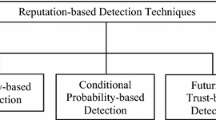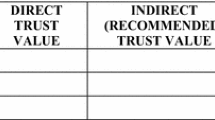Abstract
A wireless mobile ad hoc network is an autonomous system of mobile nodes, which have to cooperate in packet relaying in order to provide the necessary network functionality. Packet relaying based on reciprocity generates strong cooperation incentives even among purely self-regarding nodes. The necessary distinction between selfish and cooperative participants is provided to a node by its trust system. In this article we analyse the particular case where a reputation system is not present in the network, i.e. nodes use solely their local trust systems. In such a case, whether the cooperation is based on direct or on indirect reciprocity, depends on the information type used by trust systems of the network participants. The influence of two factors on the development of cooperation—the network size and the type of participating nodes—is analysed using evolutionary game theory. Computational experiments demonstrate that, in a small network or in a network with many non-cooperative nodes, the cooperation is more likely to be developed on the basis of both reciprocity mechanisms. On the other hand, a large network and the existence of many unconditionally cooperative nodes favour the development of cooperation on the basis of direct reciprocity.





Similar content being viewed by others
References
Chen Y, Liu K (2011) Indirect reciprocity game modelling for cooperation stimulation in cognitive networks. IEEE Trans Commun 59(1):159–168
Feldman M, Papadimitriou C, Chuang J, Stoica I (2006) Free-riding and whitewashing in peer-to-peer systems. IEEE J Sel Areas Commun 24(5):1010–1019
Giordano S, Urpi A (2004) Self-organized and cooperative ad hoc networking. In: Mobile ad hoc networking. Wiley/IEEE Press, New York, pp 355–371. Chap 13
Jensen CD, Connell PO (2006) Trust-based route selection in dynamic source routing. In: Proc. 4th international conference on trust management (iTrust 2006). LNCS, vol 3986. Springer, Heidelberg, pp 150–163
Jøsang A, Ismail R, Boyd C (2007) A survey of trust and reputation systems for online service provision. Decis Support Syst 43(2):618–644
Li Z, Shen H (2012) Game-theoretic analysis of cooperation incentive strategies in mobile ad hoc networks. IEEE Trans Mob Comput (to appear)
Marias GF, Georgiadis P, Flitzanis D, Mandalas K (2006) Cooperation enforcement schemes for MANETs: a survey. Wirel Commun Mob Comput 6(3):319–332
Marti S, Giuli T, Lai K, Baker M (2000) Mitigating routing misbehavior in mobile ad hoc networks. In: Proc ACM/IEEE 6th international conference on mobile computing and networking (MobiCom 2000), pp 255–265
Nowak MA, Sigmund K (2005) Evolution of indirect reciprocity. Nature 437:1291–1295
Samuelson L (1998) Evolutionary games and equilibrium selection. MIT Press, Cambridge
Seredynski M, Bouvry P (2010) The cost of altruistic punishment in indirect reciprocity-based cooperation in mobile ad hoc networks. In: Proc IEEE/IFIP 8th international conference on embedded and ubiquitous computing (EUC), pp 749–755
Seredynski M, Bouvry P (2011) Nature inspired approach for the evaluation of data types for trust management in MANETs. In: Proc 2011 IEEE international symposium on parallel and distributed processing workshops and PhD forum, pp 361–368
Seredynski M, Bouvry P (2012) The necessity for strong reciprocators in mobile ad hoc networks. In: Proc 2012 IEEE international symposium on parallel and distributed processing workshops and PhD forum
Seredynski M, Bouvry P (2012) Direct reciprocity-based cooperation in mobile ad hoc networks. Int J Found Comput Sci (to appear)
Seredynski M, Bouvry P, Dunlop D (2011) Performance evaluation of personal and general data classes for trust management in MANETs. J Inf Process 19:364–377
Smith JM (1982) Evolution and the theory of games. Cambridge University Press, Cambridge
Srinivasan V, Nuggehalli P, Chiasserini C, Rao R (2003) Cooperation in wireless ad hoc networks. In: Proc twenty-second annual joint conference of the IEEE computer and communications societies (INFOCOM 2003), vol 2. IEEE Press, New York, pp 808–817
Yan L, Hailes S (2008) Cooperative packet relaying model for wireless ad hoc networks. In: Proc 1st ACM international workshop on foundations of wireless ad hoc and sensor networking and computing. ACM, New York, pp 93–100
Yan L, Hailes S (2008) Designing incentive packet relaying strategies for wireless ad hoc networks with game theory. In: Proc 2008 IFIP conference on wireless sensor and actor networks (WSAN 08), vol 264. Springer, Boston, pp 137–148
Acknowledgement
This work has been partially founded by C08/IS/21 TITAN Project (CORE programme) financed by National Research Fund of Luxembourg. A preliminary version of this article appeared in [12].
Author information
Authors and Affiliations
Corresponding author
Rights and permissions
About this article
Cite this article
Seredynski, M., Bouvry, P. Analysing the development of cooperation in MANETs using evolutionary game theory. J Supercomput 63, 854–870 (2013). https://doi.org/10.1007/s11227-012-0769-7
Published:
Issue Date:
DOI: https://doi.org/10.1007/s11227-012-0769-7




